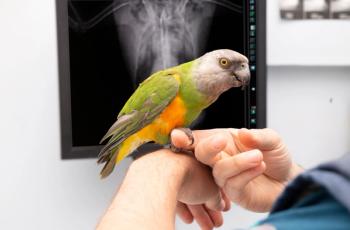
Animal-welfare issues take center stage in House hearing
AVMA's position: No assessment of animal welfare is complete unless all elements are considered.
WASHINGTON — Weigh all the facts before deciding animal-welfare issues, a veterinary expert told a U.S. House of Representatives subcommittee.
Gail C. Golab, DVM, PhD, offered testimony on behalf of the American Veterinary Medical Association (AVMA) on agricultural practices that have come under fire in recent years from welfare and animal-rights groups.
It was the first time AVMA was asked to address the welfare of animals in this kind of forum, she says.
Golab, who was among representatives of a diverse group of stakeholders — from the Humane Society of the United States to the National Association for Biomedical Research — testified on the significance of animal welfare in modern-day U.S. farming and food-animal production before the Subcommittee on Livestock, Dairy and Poultry of the U.S. House Committee on Agriculture in early May.
Highlighting some of her points, Golab says: "I addressed animal welfare as a multi-disciplinary, multi-stakeholder issue and spoke about the potential of animal-welfare science to help bridge differences in views and ensure positive animal welfare outcomes. In particular, I emphasized ... AVMA's belief that no assessment of animal welfare is complete unless all elements are considered. "It is not satisfactory, for example, to judge the welfare of an animal on the basis of its physical health, or its ability to perform or produce, without regard for whether it is suffering or frustrated. Nor is it appropriate to conclude that an animal that can engage in species-typical behavior(s) has a good state of welfare without also evaluating its health and biologic function," she says.
Additionally, Golab notes that veterinarians, by virtue of training, are "extraordinarily well-positioned" to bring the relevant elements of animal-welfare science to the table to aid key decision-makers.
The AVMA entered the session with three objectives:
1) To share information about what factors the AVMA believes Congress (and other elected officials) should consider when deciding how to best address animal-welfare concerns.
2) To convince Congress that when changes are made to animal-care practices (e.g., housing type, management practices), those changes should factor in all aspects of the system in which an animal is being cared for and should not be accomplished in a piecemeal fashion.
3) To remind Congress that veterinarians and their associations can help insure that decisions on animal-care issues are good ones and that veterinarians are (and should continue to be) critical participants in any dialog on animal welfare.
"Future discussions dealing with the welfare of agricultural animals are inevitable, and these will probably occur in a variety of formats," she adds.
AVMA was one of several diverse groups at the hearing. Others, which represented the animal-use or animal welfare/animal rights communities, included: the Humane Society of the United States (HSUS), former U.S. Rep. Charles Stenholm of Texas, National Association for Biomedical Research, National Cattlemen's Beef Association, National Pork Producers Council, United Egg Producers, National Milk Producers Federation, the American Quarter Horse Association, Farm Sanctuary, as well as individual farmers and other stakeholders.
HSUS and Farm Sanctuary representatives advocated change in animal agriculture's approach to animal care. HSUS called on the legislature to support its recent legislative initiatives, including the Downed Animal Protection Act.
The group also urged Congress to modify the title of the 2007 Farm Bill to reflect a concern for the welfare of animals in agriculture.
Groups in the animal-use sector focused on various animal-care certification programs, emphasized the contributions that voluntary approaches have made to ensuring animal welfare in the agricultural sector and expressed their preference for voluntary assurance programs over involuntary regulatory approaches, Golab reports.
A spokesperson for the National Association for Biomedical Research addressed welfare assurance under the federal Animal Welfare Act.
Ms. Skernivitz is a freelance writer from Cleveland, Ohio.
Dr. Gail Golab
Newsletter
From exam room tips to practice management insights, get trusted veterinary news delivered straight to your inbox—subscribe to dvm360.




